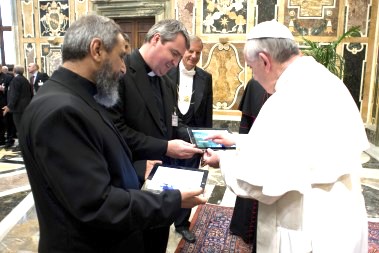Digital detox must begin with Filipino clergy
A Filipino priest once revealed to Manila Archbishop Luis Antonio Cardinal Tagle that gone were the days that the first thing he did in the morning was to focus on Christ and pray. Now, it was to read messages and see Facebook on his iPhone, the good Cardinal recounted during a forum at San Carlos Seminary in Makati.
Last year, Pope Francis reminded Christian pilgrims who take pictures with their cell phones to center their attention on God, saying that using cell phones during the Holy Mass is “a very ugly thing [to do] … not only by the faithful, but also by some priests and even bishops!”
“The Mass is not a show,” the Vicar of Christ added (Vatican City, November 7, 2017).
Shortly after his election in 2013 Pope Francis, the leader of the world’s 1.2 billion Roman Catholics, said it pained him to witness the odd signs of the times, his clergy driving flashy cars and using the smartest phones.
Twitter, Facebook, and the new evangelization
Of course, the Catholic Church isn’t against the intelligent use of the cell and the social media. On the contrary, in 2016 Pope Francis met with Tim Cook of Apple and Eric Schmidt of Google, and told them that internet chats, text messages and social networks are “a gift from God” and are, in fact, “fully human forms of authentic communication” (Message for the 50th World Day of Social Communications).
Himself enjoying a total of 40 million followers on Twitter, the Holy Father also urges cardinals, bishops and priests to navigate “the digital continent,” if they must, the internet being the best alternative means of the “new evangelization” to bring Jesus Christ to our noisy world.
Through social media, the clergy and consecrated persons in one diocese or in one congregation can reach out to thousands of Facebook (Instagram and Twitter) friends and followers bringing the Good News through articles, videos, Biblical quotes and photos.
Facebook has the most number of active monthly users (over a billion), mostly young people, and it makes perfect sense that our bishops and priests would step out into the World Wide Web in order to balance the bad news with the Gospel and the fake news with the Truth.
Not only that. Today’s social media and platforms may even be the fastest digital superhighway to reach out to the unchurched or non-practicing Christians besides the traditional pulpit.
Filipinos most addicted to social media: Should we be proud of this?
The biggest Catholic nation in Asia is also the “most engaged online hub” in the universe, with Filipino netizens spending an average of four hours per day, that is, more time on social media that anyone else in the world (survey by Digital Global Overview by WE ARE SOCIAL and HOOTSUITE). Wow!
So, there is power in “the digital continent” and today’s cellphone is the world’s most powerful communication device – but only if used wisely and in a timely manner.
I would like to share two odd but related stories, given the fact that the Holy Mass is the holiest of all holy activities and the church is the holiest of all holy places, where “God resides.”
Before the Holy Mass began one Sunday, I observed a few teenagers seated on one side of the church calling and texting with their friends who were seated just across to the other side. Odd, well, the new normal, so they say.
Because a smartphone is “a gift of God” for many practical purposes, especially in an emergency, the average Filipino is almost always addicted to it to the point of using it while driving or crossing the street, attending classes, before and after meals and during the Holy Mass.
On another Sunday Celebration, while the priest-celebrant was about to raise the Sacred Host, a cell phone rang, sounding a particularly annoying ring tone and naturally grabbing everyone’s attention. It turned out it was his.
Embarrassing, yes, too embarrassing. If only the shepherd would lead us into a prayerful silence before, during and after the Celebration, remembering Pope Francis’ reminder “The Mass is not a show” and must center on Jesus in the Word and the Eucharist–maybe, just maybe, the flock would follow.
There’s time for everything and a time to put down that smartphone, even for a while.
Finally, my conclusion. Social media, when wisely employed, can turn into a powerful tool for the “new evangelization.” And the digital detox that leads to such wisdom can begin with the Filipino clergy and consecrated persons.
______________
Jose Mario Bautista Maximiano is a Catholic writer, educator, management consultant, and motivational speaker. He is author of Pope Francis, the Catholic Bishop, and the Priest (Cardinal Sin Catholic Book Awardee for 2015). His latest oeuvre is entitled The Church Can Handle the Truth (2017).


